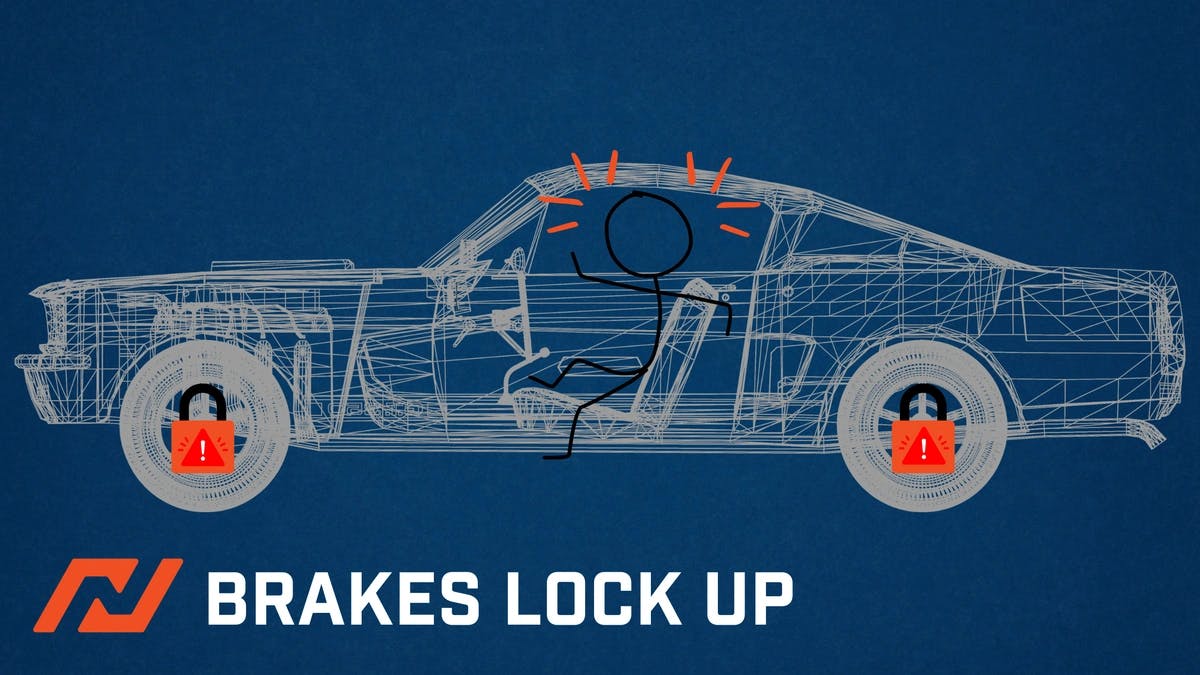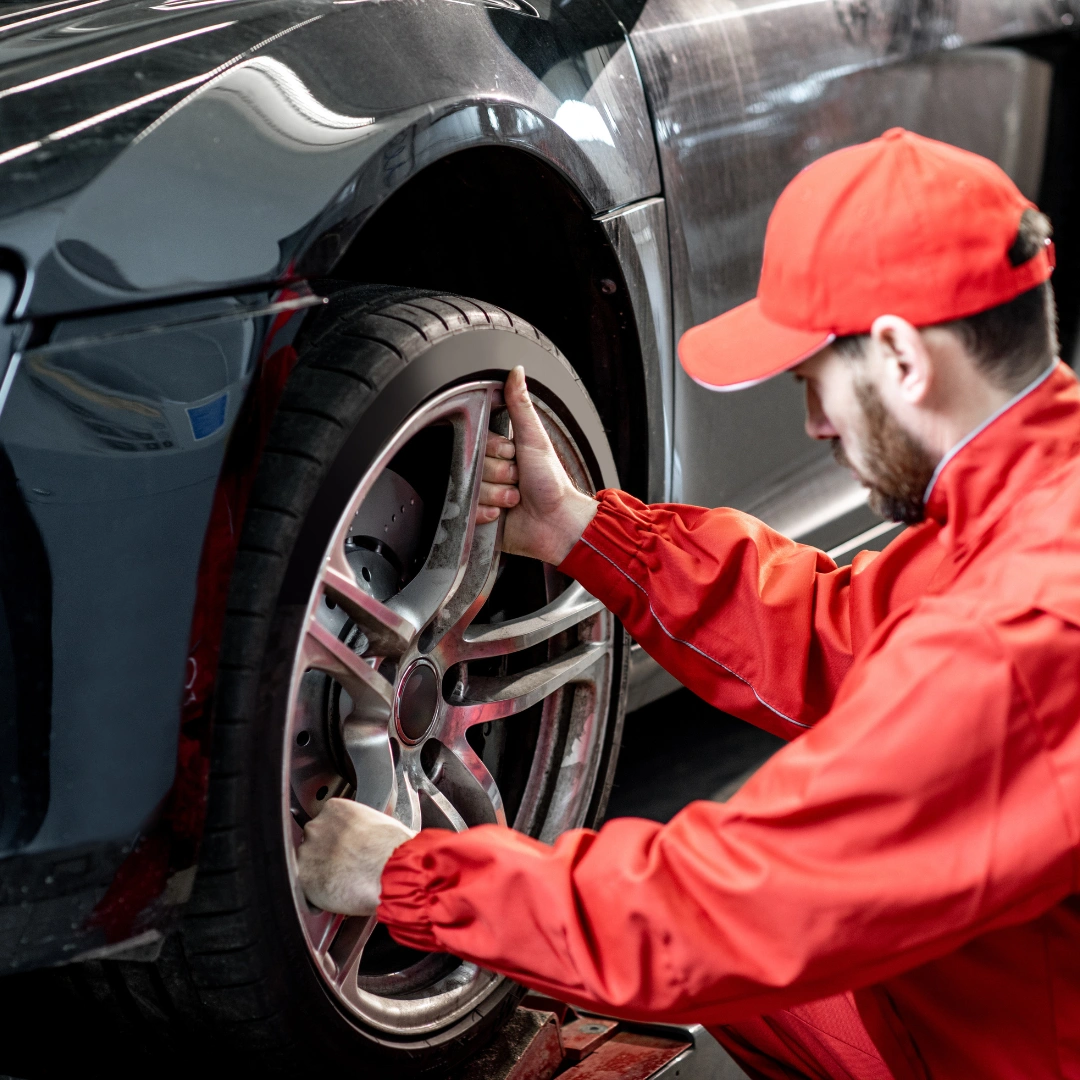Key Takeaways:
|
Why are Brakes Locking Up While Driving?
Brake lock-up essentially means that the brakes on your vehicle, instead of slowing you down smoothly when you apply them, are sticking or completely immobilizing the wheel they're attached to.
Imagine trying to roll a wheel along the ground when it's partially or entirely stuck - not an easy task!
This is a severe issue, as it can compromise your ability to control your vehicle and slow down or stop as needed.
Faulty Brake Master Cylinder
The brake master cylinder is vital to your car's braking system. It's responsible for converting the pressure on the brake pedal into hydraulic pressure to slow down or stop the wheels. If this component isn't working correctly, it can cause the brakes to engage too much or even get stuck, leading to lock-up.
Brake Line Obstruction
The brake lines carry brake fluid from the master cylinder to your car's brakes. If something blocks this line, it could cause the brake fluid not to circulate properly, potentially causing the brakes to lock up.
Worn-Out Brake Components
Just like any part of a car, the components of your brake system wear out over time. Worn-out brake pads, rotors, or other components could lead to uneven pressure application when you hit the brakes, resulting in a lock-up.
Malfunctioning Anti-Lock Brake System (ABS)
The ABS is designed to prevent the brakes from locking up during hard or emergency braking by modulating the brake pressure. However, if this system isn't working correctly, it could cause the brakes to lock up.
Improper Brake Adjustment
Brakes need to be adjusted to apply the right amount of pressure to slow down or stop your vehicle. Adjusting them too tightly could cause the brakes to engage too much and lead to a lock-up.
Faulty Calipers
Faulty calipers can lead to brakes locking up while driving because they may apply uneven or continuous pressure on the brake pads, preventing them from releasing properly. Over time, this consistent drag can cause excessive wear, heat buildup, and potentially result in a sudden and unexpected loss of braking efficiency.
How to React With a Lock-Up?
When faced with a lock-up of the brakes, it's crucial to react promptly and correctly to ensure safety and prevent any further damage.
Here are the steps when your brakes are locked:
-
Gradually release the brake pedal to disengage hydraulic pressure and alleviate the lock-up. Avoid abrupt releases to maintain control.
-
If releasing the pedal doesn't work, gently pump the brakes to relieve pressure and break free any rust or debris causing the lock-up.
-
If pumping doesn't resolve the issue, consider downshifting (in manual transmission vehicles) to slow down using engine braking.
-
Avoid continuously keeping your foot on the brake pedal to prevent overheating. Instead, apply firm but measured pressure intermittently.
-
If your vehicle has ABS, it will engage automatically during a lock-up. It modulates hydraulic pressure to maintain traction and steering control.
What to do after the brakes locked up and the anti-lock braking system was engaged?
Once you've successfully stopped your vehicle after experiencing brake lock-up and the engagement of the anti-lock braking system (ABS), here's what you should do:
-
Turn off the Engine: Once safely off the road, turn off your vehicle's engine.
-
Stay Safe: If you're on a busy road, it might be safer to remain in your vehicle with your seatbelt fastened until help arrives. Turn on your hazard lights to alert other motorists to your situation.
-
Contact Roadside Assistance: If you have a roadside assistance plan, now is the time to use it. Contact them and explain the situation. They can send a tow truck to get you and your vehicle safely off the road.
-
Arrange for Vehicle Inspection: Once you're safe, arrange to have your vehicle towed to a trusted mechanic or auto repair shop. Your braking system will need a thorough inspection to determine the cause of the lock-up and the ABS engagement.
-
Repair or Replace Necessary Components: After a professional diagnosis, necessary repairs or replacements should be done immediately. This could involve components of the braking system, the ABS, or both.
-
Test Drive: A test drive should be conducted once repairs are completed to ensure the problem has been fully resolved. A mechanic will usually do this, but it's also a good idea for you to test drive the car as well to ensure you're comfortable with its performance.
Remember, if the ABS was engaged during the incident, it could indicate a significant problem with your braking system. It's crucial to have a professional inspect the vehicle as soon as possible to avoid any potential safety risks.
What does ABS do whenever a car's brake system is locked?
When you apply the brakes, your car's Anti-lock Braking System (ABS) prevents the wheels from locking up or skidding, helping you maintain control of the vehicle, especially on slippery surfaces or during sudden stops. The system uses sensors on each wheel to detect rapid deceleration that could lead to a lock-up. If the ABS detects this, it reduces brake force to that wheel, allowing it to continue rotating and maintain traction with the road.
How to prevent brake lock-up?
Preventing brake lock-up is vital for the safety and performance of your vehicle. Here's how you can help keep your brakes from locking up:
-
Regular brake maintenance and inspections: Regular maintenance is key to a well-functioning brake system. As part of this, brake components should be inspected routinely for signs of wear and tear. Regular check-ups with a professional mechanic can help identify and address potential problems before they become severe, like lock-ups.
-
Quality brake components: Not all brake components are created equal. It's crucial to invest in high-quality parts for your brake system. These components are more reliable, last longer, and are less likely to cause issues like brake lock-up. It might be tempting to save money with cheaper parts but remember, the cost of potential damage from a lock-up can significantly outweigh the savings from lower-priced components.
-
Safe and mindful driving practices: How you drive can directly impact the health of your brakes. Aggressive driving or constant hard braking can cause unnecessary wear on your brakes and increase the chances of a lock-up. By driving mindfully and practicing gradual braking, you can reduce stress on your brake system and help prevent issues.
-
Awareness and understanding of the vehicle's braking system: It's beneficial to understand how your vehicle's brakes work. Knowing the signs of potential brake problems, such as changes in how your brakes feel or sound, can alert you to issues early on. This can allow you to address concerns before they lead to a lock-up.
Preventing brake lock-ups is about proactive care and mindful driving habits. By following these steps, you'll improve your safety on the road and the longevity and performance of your vehicle's brake system.
When to seek professional help
ABS Malfunction
Your vehicle's Anti-lock Braking System (ABS) is a sophisticated piece of technology designed to prevent brakes from locking up during instances of heavy or emergency braking. If the ABS light comes on in your dashboard or if you've experienced a lock-up despite having an ABS, this could indicate a malfunction. In such cases, it's vital to have your vehicle inspected by a professional who can diagnose and rectify the issue.
Repeated Lock-Ups
If you've experienced multiple instances of brake lock-up despite proper maintenance and mindful driving habits, it's time to consult a mechanic. Multiple lock-ups could indicate a more profound, underlying problem with your braking system that needs professional attention.
Visible Wear or Damage
Upon inspecting your brakes, if you notice any visible signs of wear or damage to essential brake components (like brake pads, calipers, rotors, or the master cylinder), you should consult with a mechanic. Such wear or damage can significantly impact your vehicle's braking performance. It could lead to a lock-up if not addressed.
Feeling of Uncertainty
Lastly, if you're unsure about any aspect of your vehicle's braking system or how to address a lock-up issue, it's always best to seek professional help. Dealing with vehicle brakes can be complex and requires expertise to ensure it's done correctly and safely.
The goal is always to maintain optimal safety on the road, and a mechanic with expertise in braking systems can diagnose and resolve issues efficiently and effectively. Seeking professional help ensures your vehicle's braking system performs at its best, providing peace of mind during your driving experiences.
Final Thoughts
Remember, understanding your vehicle's braking system, recognizing signs of potential problems, and practicing proactive care can help prevent brake lock-ups. But when things go beyond your control or expertise, that's where professional help comes in. And in cases where an ABS malfunction or visible wear and damage indicate a deeper issue, don't hesitate to seek expert assistance.
In the end, your safety on the road is what truly matters. As you master your response to potential brake lock-ups, remember to keep your vehicle's braking system in top shape with the help of professionals.
Whether you're experiencing brake issues or you want to ensure your vehicle is in the best possible condition, don't hesitate to reach out to NuBrakes Mobile Brake Repair. Our expert mechanics are ready to assist with quality and convenience at the heart of our service.
Schedule your appointment with NuBrakes today, and experience the difference in convenience and customer care with your local mechanic.



